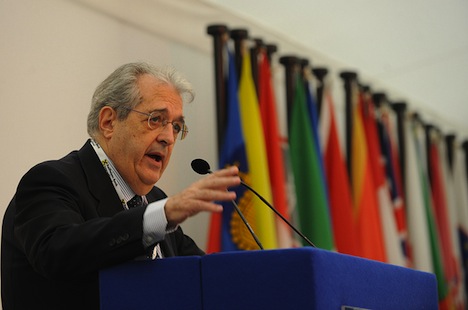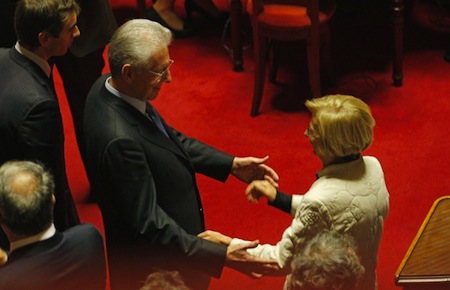White smoke from Rome — Italy has a new prime minister and a new government, just over two months after Italy’s inconclusive election results at the end of February.![]()
Just three days after Italian president Giorgio Napolitano invited Enrico Letta, deputy leader of the Partito Democratico (PD, Democratic Party), to form a new government, he has done so. As widely expected, it’s a broad ‘grand coalition’ with the Popolo della Libertà (PdL, People of Freedom) of Silvio Berlusconi, and it leaves both the PD’s electoral ally, the more leftist Sinistra Ecologia Libertà (SEL, Left Ecology Freedom) and the PdL’s autonomist ally, the Lega Nord (Northern League), in opposition along with the movement led by Beppe Grillo, the Movimento 5 Stelle (M5S, the Five Star Movement).
So what does the Letta government’s composition tell us?
The most initial word upon the government’s announcement is that of its relative youth and the record number of women. That’s very important, of course, especially in Italy, which has long seemed like a country governed exclusively by old men. Napolitano himself is 87 years old and Berlusconi, age 76, first won power in 1994.
The most striking thing is the extent to which the new cabinet members come from Letta’s own party or otherwise come from — or wouldn’t seem too out-of-place in — the government of outgoing technocratic prime minister Mario Monti, who ran in his won right in the February elections as a force for centrist reform.
Monti himself will not be a minister in the new government, but Anna Maria Cancellieri, Monti’s minister of the interior and widely regarded minister mentioned as both a potential prime minister and even as president, will become Letta’s minister of justice. Mario Mauro, a former PdL senator who resigned from the PdL to join Monti’s Scelta Civica (SC, Civic Choice), will be the new secretary of defense. Enzo Moavero Milanesi will remain as Letta’s minister for Europe, the same role he played in Monti’s government.
Perhaps the most important pick is Italy’s new finance minister, Fabrizio Saccomanni (pictured above), who like Monti before him, is a technocratic economist and the secretary general of the Banca d’Italia, which makes him essentially the deputy head of Italy’s central bank. Joining him as the minister of labor is Enrico Giovannini, since 2009 the director of Italian Statistical Institute, formerly director of statistics at the Organization for Economic Co-operation and Development from 2001 to 2009. Their appointments signal that Letta’s government will attempt to be more than just a short-lived placeholder before new elections in the autumn, and expect that they will push more reforms — perhaps even greater economic reforms than Monti’s government was able to enact.
Flavio Zanonato, mayor of Padua, a former member of the Italian Communist Party, and a strong supporter of the PD’s outgoing leader Pier Luigi Bersani, will become the minister for economic development.
Maria Chiara Carrozza, minister of education, and Andrea Orlando, minister of environment, are both up-and-coming PD deputies.
The Congo-born Cécile Kyenge, minister for integration, will be Italy’s first-ever black minister, and Josefa Idem, a West German-born and former Gold medal Olympic sprinter, will be minister for sport.
Berlusconi’s top deputy and the prime ministerial candidate of the centrodestra (center-right) in the prior elections, Angelino Alfano will take the largest PdL role in the new government as deputy prime minister and secretary of the interior, trading portfolios with Cancellieri — Alfano served as Berlusconi’s justice minister from 2008 to 2011. Maurizio Lupi, a reliable Berlusconi ally and a former Christian Democrat from Milan, will be secretary of defense. Nunzia De Girolamo, a young rising star in the PdL — she’s not even 40 — will be the new minister of agriculture.
One face I didn’t expect to see in the government was that of Franco Frattini, Berlusconi’s former foreign minister, though as one of the most respected ministers of Berlusconi’s former cabinet, I would not have been surprised to see him emerge. He’s currently trying to win the post of secretary general at NATO in 2014.
Emma Bonino, a women’s rights and human rights champion, who was also mentioned as a candidate for the Italian presidency, a longtime member of the Italian Radical Party in the 1980s, a European commissioner for health and consumer protection in the 1990s and the minister for European affairs and international trade in Romano Prodi’s government from 2006 to 2008, Bonino will be a welcomed choice for foreign minister both in Europe and beyond.

